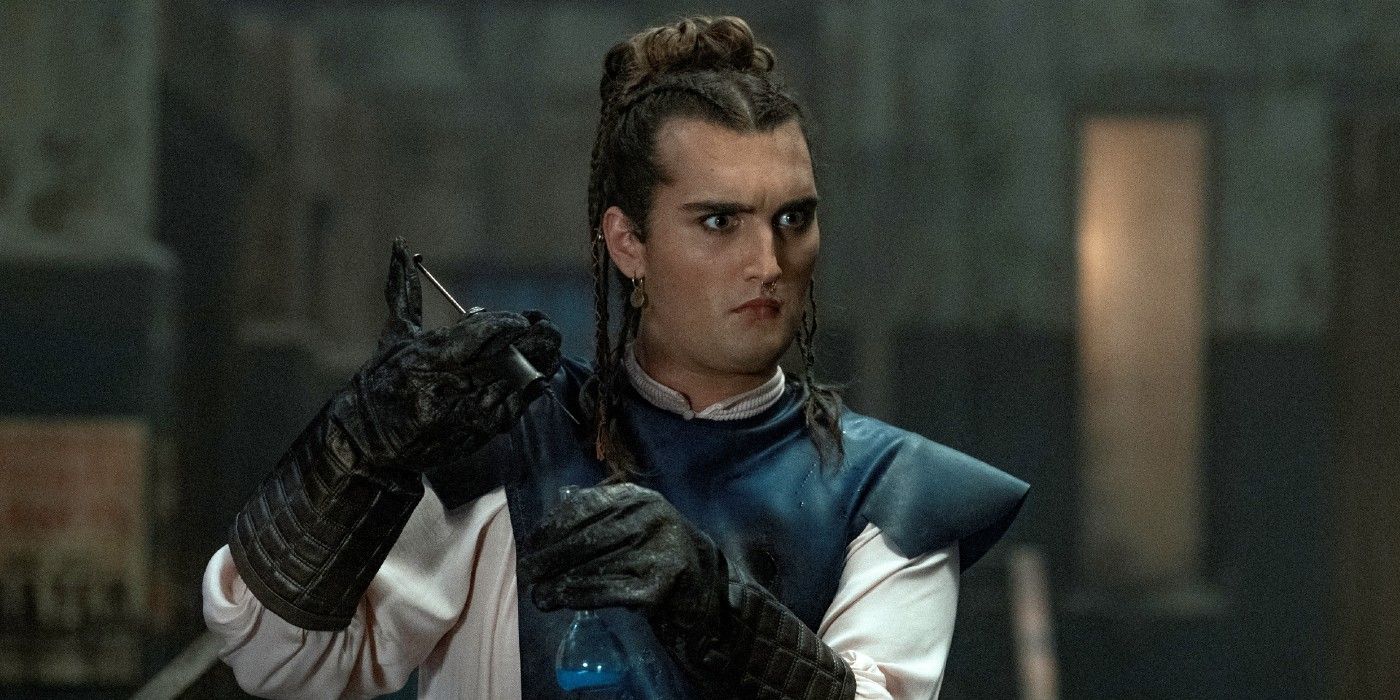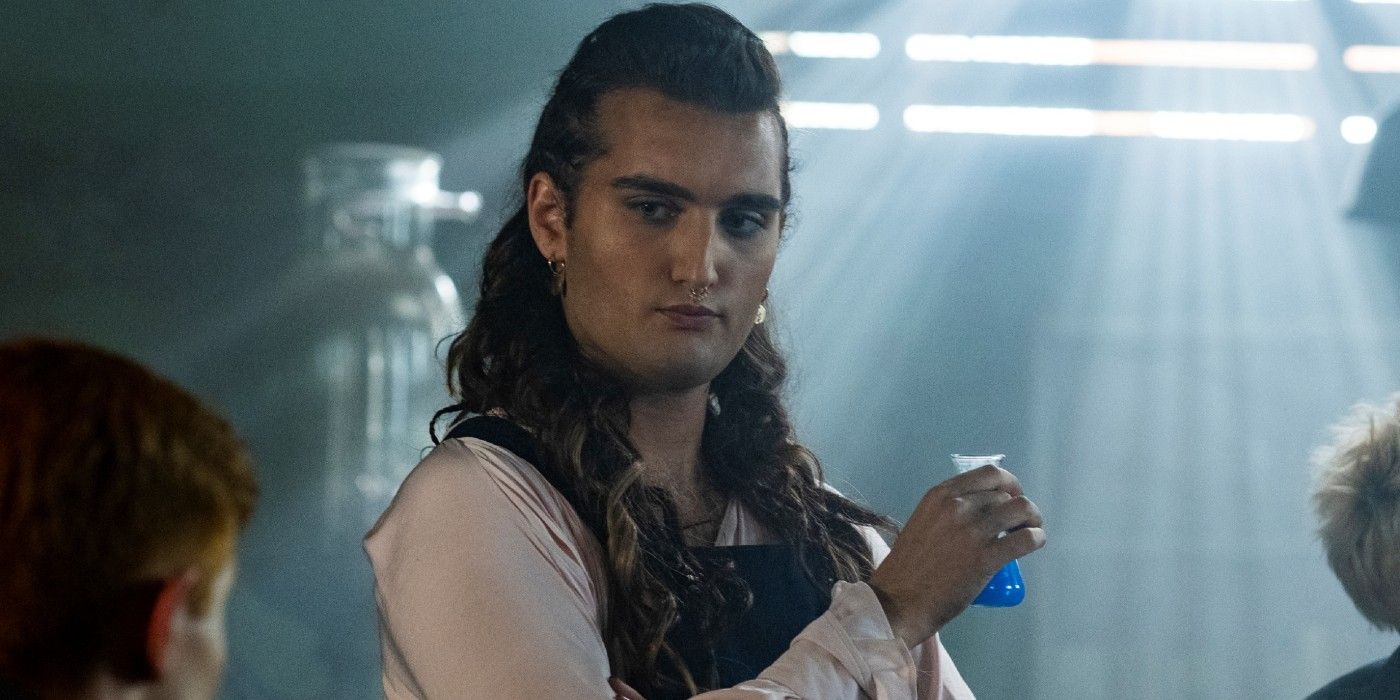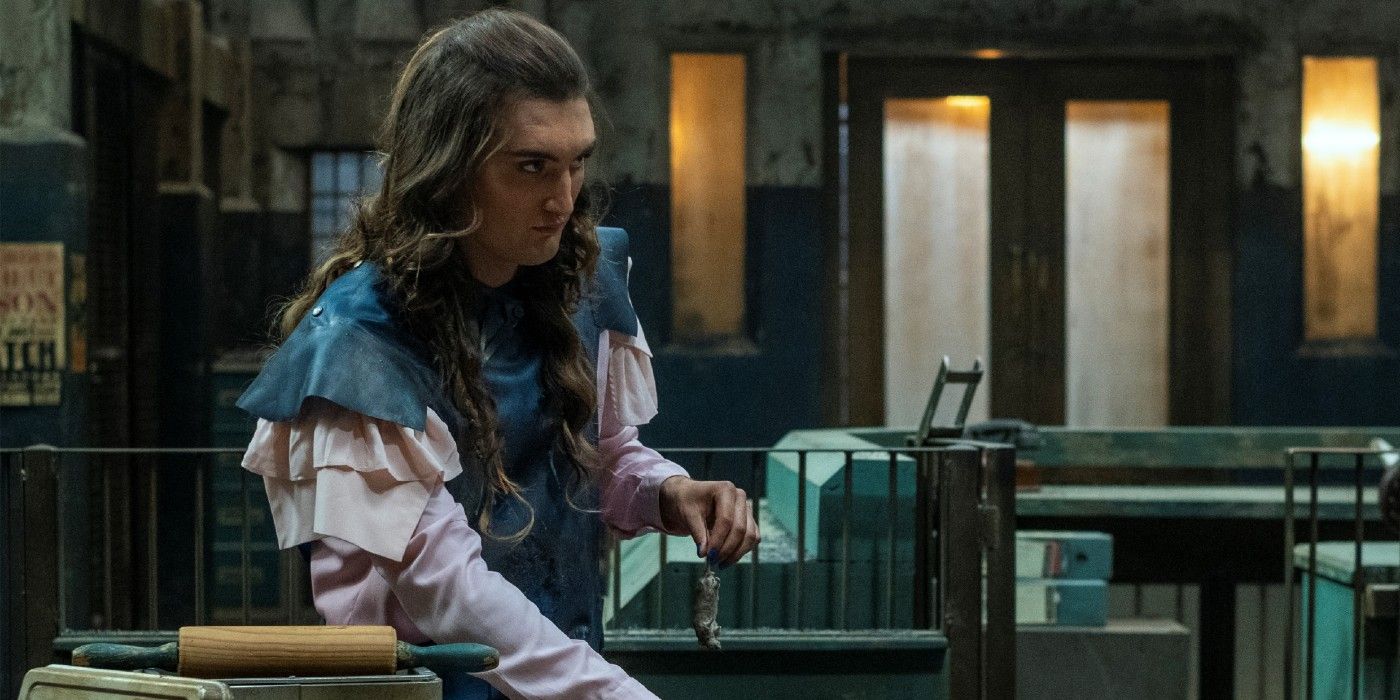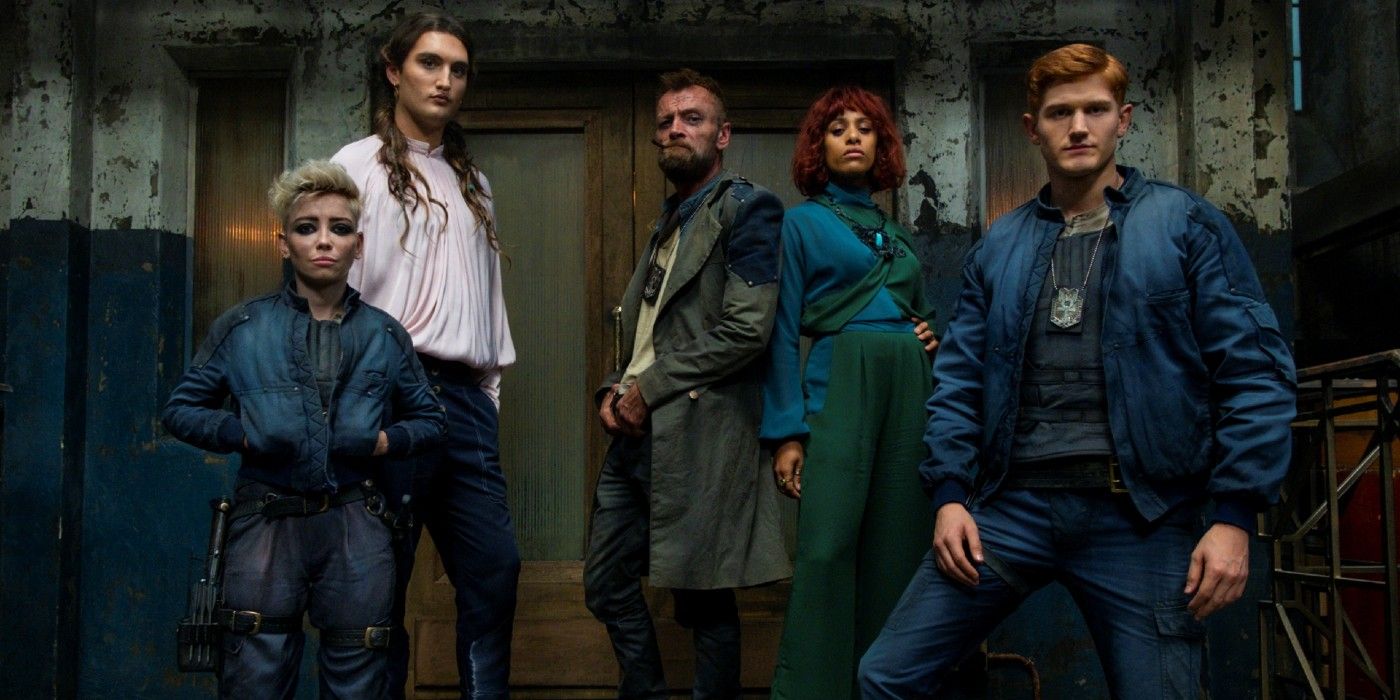From lead writer /executive producer Simon Allen and inspired by the Discworld novels by Sir Terry Pratchett, the fantasy series The Watch follows a group of misfit heroes who are forced to fight their own demons to prevent the destruction of life as they know it. Fighting an evil plot to resurrect a great dragon that will quite literally burn everything to the ground, The City Watch captain Sam Vimes (Richard Dormer) and his rag-tag team of Lady Sybil Ramkin (Lara Rossi), rookie Constable Carrot (Adam Hugill), werewolf Angua (Marama Corlette) and non-binary forensics expert Cheery Littlebottom (Jo Eaton-Kent) must do everything they can to stop it.
During this 1-on-1 phone interview with Collider, non-binary actor Jo Eaton-Kent talked about their reaction to the opportunity to play a dwarf, what most appealed to them about this show, finding Cheery’s voice, how the character’s style evolved, the experience of shooting in Cape Town, South Africa, forming a bond with this ensemble of actors, and the hope that there will be a Season 2.
Collider: When this project came your way and you were told that there was the opportunity for you to play a dwarf, what was your reaction to that?
JO EATON-KENT: I did say to my agent, “Are you sure?” She said to me, “This thing came through. It’s for Cape Town. You’ll be there for six months. It’s a fantasy series.” And I was like, “Oh, that sounds great.” And then, she said, “You’ll be playing a dwarf, if you get it.” So, I went to the audition and gave it my best shot, and they liked it. So, I got the chance to be involved.
What was it about the story and this fantasy world that most spoke to you. Because this is a show that’s a bit of a mix of genres, was there one aspect of it that you most connected to?
EATON-KENT: Obviously, the fact that these writers were willing to put on screen people that we don’t often see. That was a definite plus for me. And then, there was the anarchy of it. I was really drawn to the sense of whimsy, the wittiness of it, how tongue-in-cheek it is, and how mad it is. It’s completely mad.
When it came to Cheery, how was she described to you? Was she even described to you as a she, in the beginning, or did that evolve?
EATON-KENT: That’s an interesting question. I got the job on the premise that it was a non-binary character, and that’s something we get to explore. I don’t want to give too much away, but it’s really interesting that the show that we’re doing really gets to explore how a trans person or a non-binary person actually experiences and makes sense of their gender. That’s something we rarely get to see, people actually understanding themselves in the world that they are in and being affected by the world, in terms of gender, how people respond to it, what consequences it has, and how it can be shifted by the things that people experience.
What has that been like for you, as an actor, just in the kinds of roles that you want to play? Is that something that you also think about, as far as what you do and don’t want to represent on screen?
EATON-KENT: Yeah. I will always want to go for something that’s truthful. I will always want to go for something that is honest and that really is considerate to the fact that we are a community where, politically, it’s quite bad over here. I know from my own experience and from the people that I am friends with and am close with that, at the moment, for trans people, non-binary people, and queer people in general, there is an animosity towards us that is, in some cases, fatal. Rights are being rolled back and it’s quite scary, actually. I think what really we need to see, at this moment in time, is good representation. What (show creator) Simon Allen was brave enough to do was get a writer on board, Amrou Al-Kadhi, who is a non-binary person that really gave the character of Cheery her voice, I believe, for this day and age. (Author) Terry [Pratchett] is a genius and he was writing at a time when trans allegories were few and far between, so for him to have done that is amazing. In the same spirit, getting Amrou involved was something that I think was really brave, really honest, and really kind. I feel honored to be involved in something which is looking to progress.
One of the best things about Cheery is that she really is entirely herself. Is it fun to get to play all of the wonderful and weird sides of a character, in an environment where that is accepted?
EATON-KENT: The city of Ankh-Morpork and the Discworld has its own history, so what we understand about our own world will affect how we write our characters and how we live our lives as people who are of minority status. It’s a different world entirely and the history is different. What someone like me might have experienced in this world will not be the same experience as someone who identifies as the same in Discworld. There are people on the streets just like Cheery. Cheery has come from a place in the Discworld, a bit like if we were in a different country, which is not so accepting of the kind of person that she is, so she has to escape. There are so many parallels between the two worlds, which is fascinating about this kind of work, as well.
I love Cheery’s style and incredible fashion sense. How did the style evolve? Was that something that you got to collaborate on, or did you just get to appreciate its fabulousness?
EATON-KENT: Of course, I appreciated it. Colleen Kelsall, the costume designer, came in with this idea for a latex apron, which I thought would be great. Turns out, it’s really sweaty. The costumes were tremendous. I haven’t actually been involved, even in stage work, where I’ve had the opportunity to work on a production that has so much magic in the things that you can touch and the things that are there. The world, itself, was amazing. (Production designer) Simon Rogers is an amazing designer. He just made this whole world come to life. Along with Colleen’s costumes, Dihantus Engelbrecht got involved with me and we made some costumes. I don’t want to spoil what they are, but there is one scene where I got to wear three bespoke outfits and they are gorgeous. I can only appreciate everything that they have come up with and allowed me to be involved in.
In what ways would you say Cheery is most underestimated, and what do you think her biggest strengths are?
EATON-KENT: I think people will underestimate how she’s more tactile than you might think. Having such a vast knowledge of all things biological, forensic, and scientific, people might forget that Cheery has got a lot of power in those muscles, from living in a mine for all of those years, so I think people will underestimate how hard she can throw a punch, which is not to say that she likes throwing punches. Her biggest strength is actually her kindness and warmth. She allows that to permeate into this group of misfits and it gives her a big sense of family.
When Death is an actual character on your show, do you hope that you’ll never actually have to do a scene with him?
EATON-KENT: I know for a fact that being in the presence of that costume is quite intimidating and Craig [Macrae], the actor that’s in it, is very tall. I don’t know if Cheery would be scared of Death. Being in a mine for so many years and being in the dark, and having Death come upon you, at any given moment, because it’s a dangerous world to be in, a lot of these characters have an affinity and understanding of death that maybe we don’t. We don’t address death, in the same way. It’s not a part of the fabric of our society’s DNA. In Ankh-Morpork, everybody is dying left, right and center, so Death is very busy. I know I would be quite scared to death, but I don’t know if Cheery would be.
What would you personally still like to learn about Cheery or see happen?
EATON-KENT: I’d like to see her fall in love. I think she deserves that. I’d like to see what happens to her in the city. We don’t get to see enough of her being in the city that she chose to go to and actually living in it, as a queer individual and as someone who’s essentially an expatriate that’s living life to the fullest in a world that’s so crazy. I’d like to see her do more with the band. I’d like to see her singing more.
How did you find the experience of shooting in Cape Town? What was it like to be there?
EATON-KENT: At times, it was very, very, very hot. We had one day where we were in an outfit that consisted of Wellington boots and a cooling vest underneath two other layers, some of which were made of wool, and we had all of the hair on, and it was very, very hot. It was the hottest day of the year, in fact. I felt very sorry for the people who had to take my costume, at the end of the day. But as a country, it’s fascinating. It’s so beautiful. The culture there is bubbling and growing. I feel so honored to have been able to explore that amazing country. I think of it fondly. I have a lot of photos.
What was it like to form this team, as actors and as characters? When did you guys first meet, and what was it like to feel each other out and figure out how your characters would interact together?
EATON-KENT: We actually met the night before the read-through of the first couple of episodes, while we were in London. We all met up and had dinner, which was really nice. I didn’t actually get to chat with everybody. When we got to Cape Town, Lara [Rossi] arrived a little bit later because she was filming I May Destroy You, but we got together and I cooked dinner for everybody. I cooked spaghetti bolognaise for everybody, on everybody’s first night together, once we all had arrived in the country, and we all had a laugh. We all love each other dearly. We’ve grown a lot from the experience. It was a big step in our lives, for all of us.
It would definitely be a shame to not see these characters again because they are also fabulous and fun. Have you had conversations about the possibility of continuing this for more seasons and getting to explore this character further?
EATON-KENT: I think the same. I think it would be a shame to not take it any further. I honestly believe that a Season 2 is on the horizon because there are so many unanswered questions. Earlier, while I was making breakfast, I was thinking, “Hang on, that question never really got answered, did it?” And that’s something that everybody else is going to be feeling. It’s not because they forgot to talk about it. It’s all intentional. There are all of these questions that have yet to be answered, so I really think that this world has so much more expanding.
What have you learned about yourself, as an actor, from doing a show like this, where you get to do such different things and such a range of things? Did it teach you anything new about acting that you hadn’t expected?
EATON-KENT: Yeah. I come from a stage background and I haven’t experienced the film world, which I can imagine is slightly different from TV, but I know for a fact that TV and stage couldn’t be further apart from each other. I have to work out what I need to bring to each particular part of the job. On an earlier show that I’d done, I didn’t know what rushes were. It’s the footage that you see straight after filming, so that everyone can check that it’s all right. People kept asking me, “Have you seen the rushes?” Thank God, I knew what they were on this job because I couldn’t go six months not knowing what rushes are. I remember saying, “What channel can you find them on? What time do they air?” And they said, “No, they’re on the database.” I was like, “What are you talking about? Is The Rushes not a new show that everyone’s watching?” So, I learned a lot of the lingo. That’s the biggest thing. And I learned how different the mediums are.
The Watch airs on Sunday nights on BBC America, and is available to stream at AMC+.





